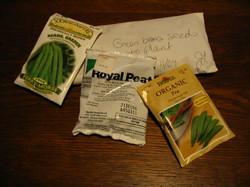Heirloom or hybrid? Annual or perennial? Understanding seed packet terms

Jim Leach | Contributor
My first spin around the rotating floor display stand revealed even more variations on packing and labels this year. Even the big labels are offering more in categories like heirloom and organics. There's truly something for everyone.
What do the terms mean when we are discussing seeds? Here's a review of some definitions to consider when making seed purchases.
Annual - An annual lives or grows for only one season. Annual flowers give one season of color to a garden. Most vegetables are annuals too, growing and being harvested in one season. Some annual plants will reseed themselves; with other annuals, seed saving is a possibility. For most annuals, count on one season.
Perennial - These are plants that live at least two seasons. Perennials grow and bloom over the spring and summer and die back in the fall or winter. In the spring, they return again from their root stock rather than from reseeding. Fruit trees are perennials, as are asparagus and rhubarb. Plants may be perennial in some regions but not others, due to varying weather conditions.
Organic seed - To label seed as organic in the U.S., suppliers must meet standards set by the government. The growers of organic seeds have to avoid synthetic pesticides and fertilizers. They must also avoid the use of genetic modification techniques.
Hybrid - A hybrid is a variety that results from crossing two different inbred parents that differ in one or more characteristics. Hybrids are made to improve the characteristics of the resulting plants, such as higher yield, better color, greater uniformity or disease resistance, to name a few. Seeds of hybrid plants, if saved and planted, would not necessary result in plants resembling the parent.
Non-GMO - These are seeds that have not been genetically modified.
Heirloom - Heirloom varieties can be defined as variety that has been nurtured, selected and handed down for many generations. These varieties are known for their flavors, rather than uniformity or ease of shipping. Some sources say the variety must be 100 years old, some claim 50 and others use 1945, the end of World War II, as the starting point. The definition of this word is also debated.
Open-Pollinated - These seeds are created by self-pollination or by the repeated crossing to the same parental type. The seed of the fruits produced by open-pollinated plants can be saved and planted the next year, with the resulting plants being true to the parental type. (With the exception of plants in the cucurbit family, I would add.)
I've previously mentioned two of our favorite seed companies, Baker Seeds and Seeds of Change. Both companies focus on offering heirloom varieties that are open-pollinated and non-GMO seeds.
If you are planning your garden right now, what companies do you rely on for seeds? How important are terms like organic, heirloom or open-pollinated when it comes to making seed purchases?
Janice and Jim Leach tend a backyard plot in downtown Ann Arbor, where they try to grow as many vegetables and other plants as possible. For the last four years, they've published gardening tips, photos and stories at their 20 minute Garden website.

